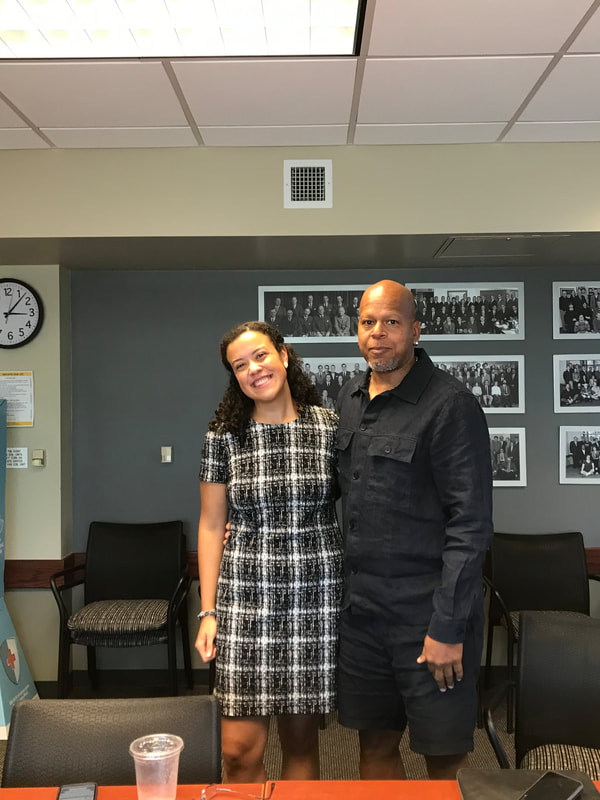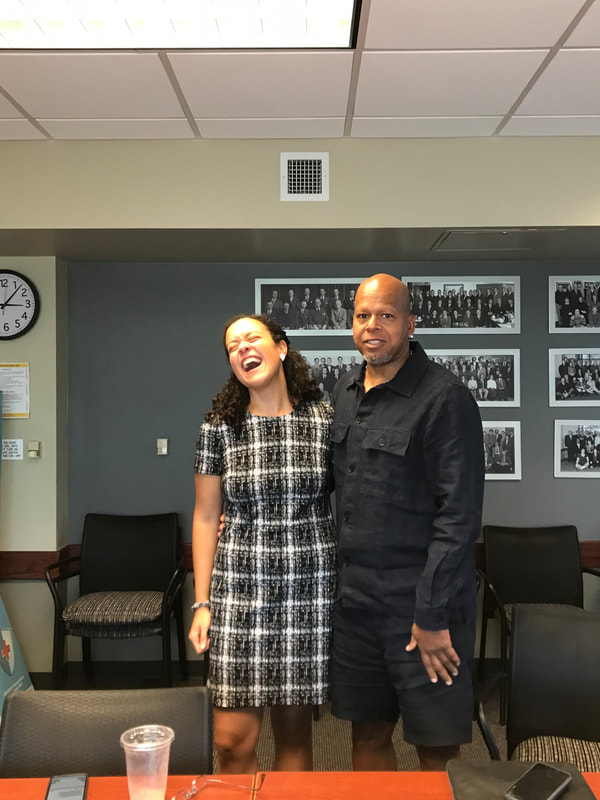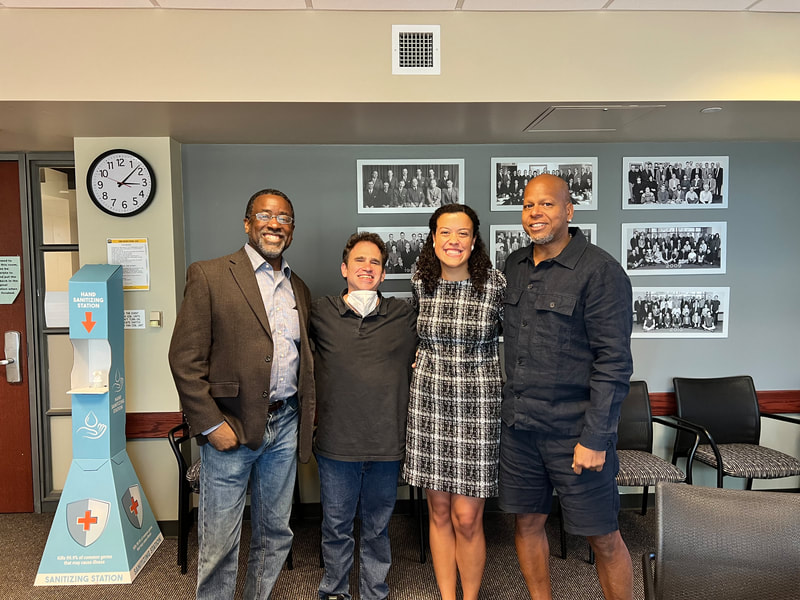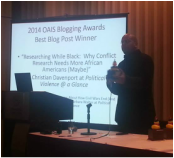First, I am not working in subfields where many African Americans have been located historically and thus it has not been easy to find students. I think it is fair to say that most have been within the field of American politics. I won’t say that they have been aggressively hindered from international relations and comparative politics (which I would view as the two fields that I have most been associated with) but they have not been as recruited and cultivated as they have in American.
For those in the room at that meeting at ISA a while back please chime in but I vividly recall a session years ago where something remarkable happened. At some point during one of the presentations, I caught the eye of Kathy Powers (a stellar unicorn as one of the first African American women in quantitatively oriented IR). We looked at one another not to say hi (because we had already done that) but rather to acknowledge that we were not the only black folk in the room (something that we had been used to at ISA). Following the session, we approached all of the students we could reach and invited them to chat for a few minutes - informally. We wanted to mark the occasion, welcome our younger colleagues and see how they were doing. This is kind of how we rolled into our Pathway program which was about recruiting, training, advising, placing and retaining black folk in comparative and IR.
The conversation was a revelation and as I recall somewhat sad. Out of the 7 or so young scholars we met, about 5 mentioned that this was likely the last comparative/IR event they would attend as they felt that there was no place for them/us in the association or subfield. They mentioned that they felt isolated in terms of the topics they were studying and that they were treated poorly whenever they talked about black folk – a relevant example they felt for many of the topics being brought up in the ISA sessions as well as their home departments. It was hard to disagree with the points they raised but I recall discussing the virtues of struggle and that there were many aspects of the problems they were discussing which it would not be possible to address within an American politics framework (e.g., the international system of capitalism, empire/imperialism and military industrial complex). By the end, the young folk were not swayed and we bid them farewell to try their luck in American (and America). We could not retain the youth in IR/comparative because the American pull was too strong. I would argue that it still is and that needs to change.
Second, I am not working in a topic area that Americanists generally felt useful/interesting (i.e., political conflict and violence) and thus it has been difficult to find students. Americanists have not generally focused on conflict and violence or at least that is what the mainstream is led to believe. Once upon a time, however, this subfield led discussions about what is power and who has it. You might recall the “three faces” discussion but this really just focused on decision-making (associated with Lukes). More relevant to coercion and force was the discussion of alternative concepts/expressions: i.e., power-to, power-over as well as power-with (associated with Mary Parker Follett). Some even tried their hand at discussing social movements as agents of change (most prominently including the Civil Rights Movement) and riots/rebellions (associated with diverse political-sociologists like Tilly, Gurr and Eisenstadt). This was pretty early on though and most don’t go back that far. This focus was even moreso developed in sociology which not only explored these same topics at the same time but they continued to explore them past the 1970s and 1980s. What we have been left with, as John McCamant argued is a field where political scientists have advocated a somewhat antiseptic conception of politics where there is essentially no place for coercion and force – even as political authorities use these activities. This has led to focus on the “inside game” (i.e., the things done within already established institutions) and it essentially led to ignoring those not on the inside as well as what they might do in order to be heard. That was then, however. Now, folks realize that the inside game is not the only game being played. Add to this revelations of U.S. enacted/facilitated torture following 9/11, the attempted insurrection during the Trump administration as well as the police response to black folk in general and the movement regarding police violence, individuals within the academy and beyond have come to focus on political conflict and violence. Those paying attention have also been motivated to focus on the topic through newer revelations about internationally used coercion and force undertaken by the US government during Afghanistan as well as throughout US history as discussed in “the United States of War,” the selective use of violence following the drone program and the development of a global police state facilitated through direct participation, training as well as grants.
Third, I needed to be in a department where enough of my colleagues were supportive of a dissertation which brought political conflict and violence into an American context and/or I was in a position where disinterested/hostile colleagues could be overrun. When I was at the University of Houston, there were not enough conflict/violence people nor enough Americanists who expressed an interest in the topic that would have allowed a committee to be created. This awareness of departmental dynamics influenced the selection of my next 4 jobs as I realized what was taking place. But, for three of these jobs, I was still not able to pull off a Kiela because I still needed to have enough students of color being brought into the department where the traditional American pull could be worked on and eventually overcome. In addition to this, I also realized that I needed to be senior enough that I could cultivate/support as well as defend/protect student interest from the numerous questions and challenges that others in the department would put forward regarding an unconventional pairing of topic area and geographic focus.
It took me 30 years to figure all this out and Kiela is to be understood in this context. She represents a newer wave of scholars who are attempting to understand the place of conflict and violence in the United States. Specifically, Kiela is interested in understanding how anti-racial/ethnic violence impacts political attitudes of those targeted and those witnessing this violence. She is also interested in comprehending how anti-racial/ethnic violence prompts individuals as well as communities to engage in political behavior. This is important work because it expands the landscape of that which is believed to be important. Americanists are seemingly more open to hearing this (although I was somewhat optimistic about new scholarship being developed on the problems of the Patriot Act) and I imagine that over the next decade or so we will see more turn in this direction. While generally hopeful about this, however, I fear that there will not be enough of a search backwards in time to extract the best/brightest ideas that have been developed on the relevant subject. Folks in political science in particular and the social sciences in general are not good at standing with those who have come before. I don’t like the phrase/image of standing on the backs of these people because it sounds like we are exploiting and using them in some way. Rather, I like to think of standing together – Follett’s “coaction”/”coactivity” – looking forward. And, I am not just talking about looking to political science. I think that it is becoming increasingly clear that studying and understanding political conflict and violence in the American context as well as the rest of the world requires that all disciplines be drawn upon: i.e., political science, sociology, economics, psychology, history, public policy, law and (dare I say) literature as well as film. Indeed, hopefully we will acknowledge that the interdisciplinary study of conflict and violence is the best and only way for the American scholarship to go. Kiela was able to pull this off in her dissertation (another reason for being proud). Time will tell if others move in a similar direction.




 RSS Feed
RSS Feed
